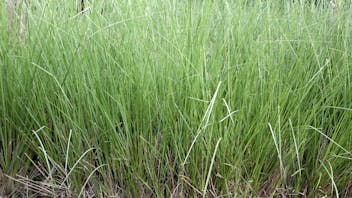Product Overview
Vetiver – Double Distilled has an exceptionally smooth, deep, earthy, refined aroma with a very mild green top note; it is smoother and mellower than our other Vetiver oils and without any smoky or harsh notes yet has the typical tenacious character and an appealing sweet wood quality – simply beautiful! Double distillation entails subjecting Vetiver roots to two extraction processes, the first via traditional steam distillation. In the second extraction, the roots are subjected to molecular distillation. Along with a bit of pigment, high boiling fractions of Vetiver are removed, increasing vetiverol content. Molecular distillation also produces a lighter colored oil and a refined, super smooth Vetiver aroma without any rough edges.[1]Vetiver – Double Distilled is an ideal fragrance material for natural perfumers.
More than just a simple grass, its chemical complexity is why Vetiver is often thought of as a perfume in itself. It is an outstanding base note with excellent fixative qualities. Vetiveria zizanioides is composed of more than 100 mostly sesquiterpene constituents; three in particular – khusimol, α-vetivone and β-vetivone – are thought of as the 'fingerprint' of the oil and are responsible, in large part, for the characteristic odor and properties of Vetiver.
Also known as vetivert, khus, or khus khus, Vetiver has a long history of use and is very well known as the Oil of Tranquility.[2] It is obtained from the roots of a tropical grass originally from India and Sri Lanka, but the roots are also now cultivated in many tropical countries for household purposes and as an effective strategy to prevent soil erosion. From time immemorial, one of the oldest aromatic uses of Vetiver roots is to weave them into mats which, when dampened with water and hung in windows like curtains, cool and scent the air with a pleasant aroma.[3]
Vetiver essential oil varies dramatically in aroma depending on where it is grown (terrain, climate, cultivation) and how it is distilled. Guenther stresses that the distillation of heavy, sesquiterpene-rich oils like Vetiver must continue for hours despite the apparent lack of increase in volume, "otherwise valuable, high-boiling constituents will be lacking in the oil."[4] Dense and syrupy, Vetiver essential oils, much like Patchouli and Sandalwood oils, undergo chemical transformation and improve with age, making them very good base notes and fixatives in natural perfume and incense formulations.[5],[6]
1 Industry communication.
2 Davis, Patricia. Aromatherapy: An A-Z, 1988, p. 330.
3 Guenther, Ernest. The Essential Oils, Vol. IV, 1950, p. 156.
4 ______________. The Essential Oils, Vol. I, 1947, p. 153.
5 Arctander, Steffen. Perfume and Flavor Materials of Natural Origin, 1960, p. 651.
6 Hughes (MSc), Kerry. The Incense Bible: Plant Scents that Transcend World Culture, Medicine, and Spirituality, 2007, pp. 137-8.



